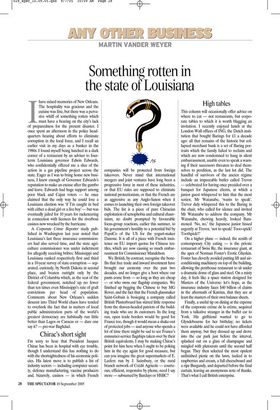Something rotten in the state of Louisiana
Ihave mixed memories of New Orleans. The hospitality was gracious and the cuisine was fine, but there was a pervasive whiff of something rotten which must have a bearing on the city’s lack of preparedness for the present disaster. I once spent an afternoon in the police headquarters hearing about efforts to eliminate corruption in the local force, and I recall an earlier visit in my days as a banker in the 1980s: I found myself being lunched in a dark corner of a restaurant by an adviser to fourterm Louisiana governor Edwin Edwards, who confidentially offered me a slice of the action in a gas pipeline project across the state. Eager as I was to bring home new business, I knew enough of Governor Edwards’s reputation to make an excuse after the gumbo and leave. Edwards had huge support among poor black and Cajun voters — he once claimed that the only way he could lose a Louisiana election was ‘if I’m caught in bed with either a dead girl or a live boy’ — but was eventually jailed for 10 years for racketeering in connection with licences for the riverboat casinos now wrecked by the hurricane.
A Corporate Crime Reporter study published in Washington last year noted that Louisiana’s last three insurance commissioners had also served time, and the state agriculture commissioner was under indictment for allegedly receiving bribes; Mississippi and Louisiana ranked respectively first and third in a 10-year survey of state corruption — separated, curiously, by North Dakota in second place, and beaten outright only by the District of Columbia which, as the seat of the federal government, notched up no fewer than ten times even Mississippi’s rate of graft convictions per head of population. Comments about New Orleans’s sudden descent into Third World chaos have tended to overlook the fact that in matters of local public administration parts of the world’s greatest democracy are habitually run little better than Lagos or Caracas or — dare one say it? — pre-war Baghdad.
Chirac’s short sight
I’m sorry to hear that President Jacques Chirac has been in hospital with eye trouble, though I understand this has nothing to do with the shortsightedness of his economic policies. His latest move is to publish a list of industry sectors — including computer security, defence manufacturing, vaccine producers and, bizarrely, casinos — in which French companies will be protected from foreign takeovers. Never mind that international mergers and joint ventures have long been a progressive force in most of these industries, or that EU rules are supposed to eliminate national protectionism, or that the French are as aggressive as any Anglo-Saxon when it comes to launching their own foreign takeover bids. The list is a piece of pure Chiracian exploitation of xenophobia and cultural chauvinism, no doubt prompted by favourable focus-group reactions, earlier this summer, to his government’s hostility to a potential bid by PepsiCo of the US for the yogurt-maker Danone. It is all of a piece with French insistence on EU import quotas for Chinese textiles, which are now causing so much embarrassment for Commissioner Mandelson.
We British, by contrast, recognise the benefits that free trade and inward investment have brought our economy over the past two decades, and no longer give a hoot where our pants come from — so long as they are cheap — or who owns our flagship companies. We finished up begging the Chinese to buy MG Rover, and the fact that the French glassmaker Saint-Gobain is besieging a company called British Plasterboard has stirred little response from the shaven-headed patriots of the building trade who are its customers. In the long run, open trade borders would be good for France too, though it would mean a shake-out of protected jobs — and anyone who spends a lot of time there might be sad to see France’s consumer-service flagships taken over by their British equivalents. I may be making Chirac’s point for him here when I ought to be poking him in the eye again for good measure, but can you imagine the great supermarkets of E. Leclerc run by J. Sainsbury, or the rural branch network of Crédit Agricole — courteous, efficient, responsive by phone, need I say more — subsumed by Barclays or HSBC?
























































 Previous page
Previous page